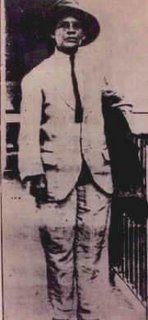Luisa Capetillo

Capetillo was born in Arecibo, Puerto Rico on October 28, 1879. Her mother, Luisa Margarita Perone, a French immigrant, arrived in Puerto Rico in search of employment as a tutor for the children of a prominent family in Arecibo. Instead, she was hired to do domestic work. Her father, Luis Capetillo Echevarria, arrived in Puerto Rico from Spain. Although he’d planned to make his fortune in Puerto Rico, he ended up working in various trades.
Capetillo’s parents shared the same philosophical and political ideology. They lived together and raised Luisa, their only child, but never married. Capetillo was educated at home where she received a more liberal education than what young women could expect at that time. Both her parents encouraged open and free debate on many issues which opened her mind to different ideas and philosophies. She adopted an anarchist philosophy and it was those ideals that she lived by. She was baptized a Catholic, but rejected religion. However, she was not an atheist.
At the age of 19, she met and fell in love with Manuel Ledesma, a young man from a prominent family in Arecibo. They became lovers, and in 1898 their first child, Manuela, was born. Two years later their son Gregorio was born. Luisa and Manuel never married, and after three years their love affair ended.
Now a single mother, Capetillo left her children in the care of her mother and took a job in the textile industry. Subsequently, she became a reader in the tobacco factories in Arecibo. A reader sat or stood at a podium on the factory floor and read aloud so that the workers who stemmed the tobacco leaves and rolled the cigars could hear. It was there in the tobacco factory that Capetillo had her first contact with the union — La Federacion de Torcedores de Tabaco (The Federation of Tobacco Rollers) which was affiliated with La Federacion Libre de Trabajadores (The Free Federation of Labor).
Luisa Capetillo was the first Puerto Rican woman to commit to writing her feminist ideas and theories on the rights of women. In 1909, Luisa wrote and published Mi opinion sobre las libertades, derechos y deberes de la mujer (My opinion about the liberties, rights and responsibilities of women) which is the first feminist thesis written in Puerto Rico. Although she considered herself a feminist, she did not join any of the feminist organizations that emerged during that time. She instead dedicated all her efforts to the labor movement, believing that the union was the vehicle for poor working women to obtain justice and equality. She wore pants in public, challenging the social mores of the time. She advocated for free and liberal education for all men and women. Perhaps one of her most controversial ideas was "free love," which many misinterpreted as encouraging promiscuity. In her essays she explains that women should choose whom they will love freely, without legal interference or matrimony. In 1911, Capetillo gave birth to her third child, Luis Capetillo. She published the first edition of her book entitled Mi Opinion.
In 1912, Capetillo traveled to New York City where she established ties within the Cuban and Puerto Rican tobacco workers. She wrote for various radical and anarchist papers. A year later she moved to Tampa, Florida where she worked as a reader in one of the tobacco factories. During her stay, she published the second edition of Mi Opinion. The next stop in her travels was Cuba where she joined the sugar cane workers in their strike which was organized by la Federacion Anarquista (the Anarchist Federation of Cuba). She circulated a manifesto which advocated violence and was ordered to leave the county. She was later arrested for "causing a public disturbance" by wearing men’s clothes in public. She challenged the court, arguing that there was no such law that prohibited her from wearing men’s clothing. The judge agreed, and the charges were dropped. News of this episode was published in all the major newspapers in Cuba and Puerto Rico.
She returned to Puerto Rico where she organized and participated in several strikes, including the Sugar Cane Strike of 1916. Over 40,000 workers in 32 municipalities participated in this strike which resulted in an average salary increase of 13%. The period of 1916-1918 was the most intense in terms of strike activity in Puerto Rico’s history. During this period Luisa traveled back and forth to New York City where she had established a guest house and café. She also traveled to the Dominican Republic in support of striking workers in 1919.
Luisa Capetillo was overcome by tuberculosis and died on October 10, 1922. From all accounts, she lived intensely — almost until the moment of her death she fought for workers causes and the emancipation of women.
Some books by Luisa Capetillo:
Mi Opinión
Ensayos Libertarios
La Humanidad en el Futuro
Influencias de las Ideas Modernas
Books about Luisa Capetillo:
Amor y Anarquia
By Julia Ramos
The Story of Luisa Capetillo, a Pioneer in Puerto Rican Feminist
By Norma Valle Ferrer
